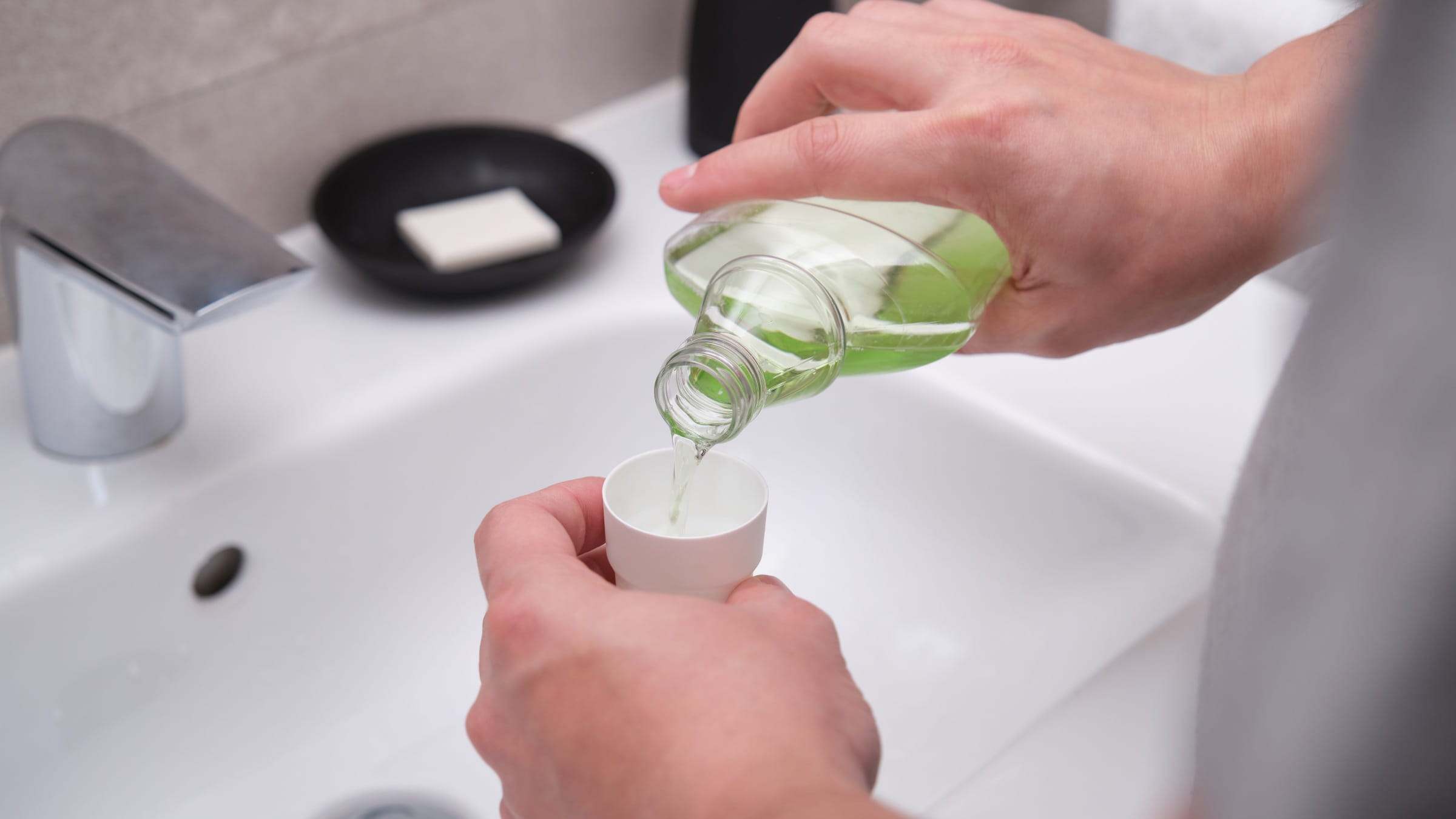
Whether you’re trying to get rid of garlic breath, prevent cavities or stave off gum disease, you may be concerned that swishing mouthwash will upset the balance of bacteria/”bugs” in your mouth and cause health issues.
The chance is very low, especially if you use it on a temporary basis. Mouthwash acts as a barrier, reducing the bacteria from attaching to the teeth. And, because it has such a short amount of contact with those bugs, there isn’t much concern that it could wreak havoc in your mouth. Read on for answers to more common questions about mouthwash and the mouth’s microbiome.
Is mouthwash safe to use?
Mouthwashes are cleared by the U.S. Food and Drug Administration, endorsed by the American Dental Association and, in general, safe to use. But keep in mind that they are used for prevention of oral health issues and will not treat those issues.
What is the microbiome in the mouth, and how does mouthwash affect it?
The microbiome is the balance of healthy and unhealthy bacteria in the mouth. Mouthwash can change the proportion, but there’s not much evidence to show this is cause for concern, especially when it’s used on a temporary basis.
What are benefits of mouthwash?
Mouthwash can help reduce the chance of getting gingivitis, which causes inflammation of the gums, the soft tissue around the teeth. Gingivitis can lead to worsening gum disease that ultimately involves losing jawbones around teeth (periodontitis).
Mouthwash also can be useful on a temporary basis to help prevent cavities for people wearing braces or who have recently had gum surgery and have difficulty brushing their teeth.
It’s important to emphasize that you need to use mouthwash before problems develop. Once you progress to gum disease or jawbone loss, or once bacteria become calcified (calculus), mouthwash won’t help.
What are some drawbacks of using mouthwash?
Sometimes mouthwash can stain teeth after a few weeks of use, because certain formulas attach to the tooth. In some people, the chemicals can affect taste.
Also, many mouthwashes contain alcohol and can be detrimental to people who are sensitive to alcohol. Mouthwashes with alcohol also should be avoided by children and pregnant people.
Is there a link between the oral microbiome and high blood pressure?
There is some correlation between oral hygiene and heart health. Patients with poor oral hygiene habits have a higher chance of developing cardiovascular complications when compared with patients with good oral hygiene habits. However, there could be other factors at play. For example, patients with poor oral hygiene habits may tend to have other habits that contribute to heart disease.
There also is some preliminary data that shows bacteria that's usually found in the oral cavity also being found in the heart of a patient who suffered from heart complications. That's indirect evidence that somehow oral bacteria may migrate, but it's not strong evidence.
However, good oral hygiene is simple to achieve, costs very little, and there are many possible benefits. So, if there’s potential to improve your heart health by taking care of your teeth, you should brush and floss regularly and use mouthwash if you choose.
Is there a benefit to probiotic mouthwash?
The concept of probiotic mouthwashes is to supplement the user’s good bacteria. But currently, there's no strong evidence to show that probiotic mouthwashes are better than standard mouthwashes.
How do I choose a mouthwash?
Choose a mouthwash tailored to what you’re trying to prevent. If you have gingivitis or some initial gum problems, choose one that targets gum inflammation. If you want to prevent decay from occurring, you could choose one that contains fluoride. Consult with your dentist about this.
If you’re pregnant, have children in the home or are susceptible to alcohol, choose one that’s alcohol-free.
Does mouthwash help with bad breath?
The causes of bad breath are gum disease, stomach issues, sleep problems, stress and specific types of bacteria in your mouth. Sometimes mouthwash helps. Sometimes it doesn’t. But it’s just a temporary fix. If you have chronic bad breath, you need to determine the root cause and address it.
How would I know if I have an imbalance of mouth bacteria?
It's hard to know if the bacteria in your mouth are imbalanced unless you do a bacterial test, which looks at the profile in your saliva. It’s possible you may have symptoms. Some bacteria cause cavities and some cause gum disease.
How often should I use mouthwash, if I do use it?
Depending on the type of mouthwash you use and why you’re using it, you’ll want to use it twice a day or maybe three or four times, based on instructions on the bottle. This frequency is related to how long the mouthwash maintains enough concentration to act on bacteria in the mouth.

Healthy teeth start here
Ohio State offers complete general and specialty dental care, including emergency care for patients of all ages.
Schedule an appointment




